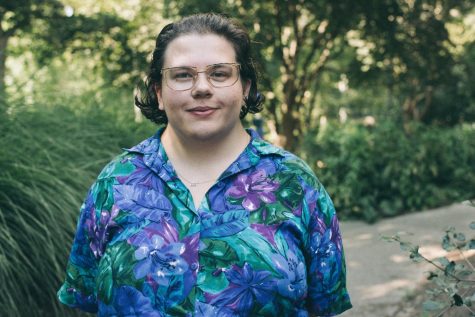Female Bodybuilders Raise the Bar: GIRL POWER
This is not what she signed up for, the spotlight brightly shining down, glistening off her bikini, as she struts flirtatiously. She is playing up a persona that judges appreciate, a game of pageantry in the name of health and fitness.
Lauren Hinkel, 22, is a bodybuilder. She is a junior at George Washington University majoring in human services and social justice. She started competing last summer after a year and a half on the GW Rowing Team, and has started training for powerlifting competitions.
Hinkel’s first bodybuilding competition was a letdown in her eyes due to the nature of the category she competed in—”bikini”, which requires the least muscular definition and the most pageantry onstage.
“After bikini I felt kind of low because there was no sense of accomplishment,” she said. “It was political because judges and trainers were friends [with each other]. I wanted something more challenging.”
Still, her experience did not stop her from training for another bodybuilding competition later this year, but now she will compete in the category of figure. Less showy than bikini, “figure” is judged more on a contestant’s muscle and definition. Compared to the pageantry of strutting in front of the judges in bikini, competitors are given poses they must show and are judged on how their bodies look in specific poses.
Maria Kalika, 21, another GW student majoring in exercise science pre med, performed in two bodybuilding competitions before she decided to move on to a different sport, powerlifting.
At a powerlifting competition, people compete in up to three categories: squat, dead-lift and bench press. Competitors have three chances to complete the lift, and that is it. Kalika competes in all three categories.
“Bodybuilding is really hard in college because it is expensive and it is hard to keep the strict diet,” Kalika said.
Onstage, Kalika meticulously sets goals in mind for how much she will lift. For each category she starts off with a lighter weight she knows she can lift: 105 pounds with the bench, 205 pounds with the squat and 260 pounds with the dead-lift. She says that in her next two attempts, the only thing running through her head is self-encouragement. “It’s heavy, and I hope you get this,” she thinks. Then she jumps the weight up, first to something she is less comfortable with, then to something she has rarely done.
Judges critique her form as she performs the exercises. They judge her best attempt against those of the other females in her weight class.

In high school, Hinkel was overweight at 218 pounds. She dreamed of rowing on GW’s crew team and decided to join her local gym in Katy, Texas, to get fit. There she met her trainer, Kelvin Franklin, a powerlifter.
But after a year and a half on the rowing team, Hinkel was injured and needed hip surgery, propelling her to think differently about how her body looked.
“With rowing, I didn’t like the type of cardio I was doing,” Hinkel said. “I had no body shape.” As a rower, she felt too bulky in her upper body. She wanted a sport more customized to how she wanted her body to look.
“Bodybuilding is an art,” Hinkel said. “It is sculpting each body part.”
More than an art, bodybuilding became Hinkel’s life, not just a stage routine she does during school breaks. She works out five times a week for up to two hours a day, and she prepares all her meals weekly.
“Bodybuilding is only you and your coach,” Hinkel said. She receives daily workout routines from her trainer in Texas through the mobile app Webfit.
Kalika does not have a trainer helping her at the gym or at competitions. She started working out based on what her friends were doing. From there she built a routine that, for bodybuilding, focused on a longer time holding each rep and a higher number of reps.
Both women face constant criticism while at the school gym. People, especially men, will stare and comment on the girls’ workouts. In condescending tones, they suggest that “women shouldn’t have muscle,” or that the women are on steroids because they are able to lift so much.
“I can lift more than guys at the school gym and I know how to do it,” Kalika said. “It is annoying for me to be bothered [by this].”
The casual sexism of the GW gym, combined with a lack of proper equipment for powerlifting, compelled Kalika to start driving 40 minutes out of the District to Powerhouse Gym in Woodbridge, Virginia to train. Here, Kalika says she is in a community of people that understands what she does and why she is doing it.
Hinkel does not see her regiments and competitions as a part of her life. They are her whole life.
“Bodybuilding is a lifestyle,” Hinkel said. “It is what happens after the tan is gone and the heels are away. It is what happens in the gym and the kitchen and what gives you power and strength. It can be destructive if people compare themselves to others, but it is not about that. You are your own competition.”

Senior studying journalism and computer science. Has been known to cry over Chicago. I'm really interested in figuring out how journalism can be used as...









